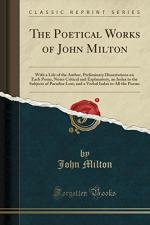|
This section contains 356 words (approx. 1 page at 400 words per page) |

|
Sonnet 19 Summary & Study Guide Description
Sonnet 19 Summary & Study Guide includes comprehensive information and analysis to help you understand the book. This study guide contains the following sections:
This detailed literature summary also contains Quotes and a Free Quiz on Sonnet 19 by John Milton.
The following version of this poem was used to create this guide: Milton, John. "Sonnet 19: When I Consider How My Light is Spent." The Poetry Foundation Online. https://www.poetryfoundation.org/poems/44750/sonnet-19-when-i-consider-how-my-light-is-spent.
Note that all parenthetical citations refer to the line number from which the quotation is taken.
"Sonnet 19" or sometimes called "On His Blindness," was written by the English poet John Milton in the early 1650s. Milton had recently become completely blind after a long struggle with his declining vision. This poem depicts his attempt to learn how to live in this newly "dark world" (2). Particularly, he is concerned with how to "serve... my Maker" without access to the poetic talents that he used to praise God in the first half of his life (5). He grapples with feelings of despair and uselessness, but then realizes that God's "kingly" state means he is not dependent on human service (12). He can serve God simply by resting and waiting.
Milton lived during a tremendously tumultuous time in English history, when political and religious changes were common and often accompanied by violence. He was born in 1608 and attended Cambridge with the intention of becoming an Anglican priest. However, he struggled to adapt the rigid university curriculum, and began to pursue writing instead. He studied and traveled widely, publishing both poetry and political tracts at this time. Milton was a firm supporter of the Christian Bible, individual freedom, and of a republican form of government for England, a dangerous political position to occupy while the English monarchy still reigned. He had four daughters, some of whom helped him transcribe his poetry after he went blind. He was completely blind by the time he wrote this poem, and in the years afterward when he completed his magnum opus, Paradise Lost. Paradise Lost solidified Milton's recognition as one of the greatest poets of the English language.
"Sonnet 19" is among his most famous poems. It is a Petrarchan sonnet, broken into two discernible parts: an octave (eight lines) and a sestet (six lines). The poem is written in iambic pentameter with rhyme scheme ABBA ABBA CDE CDE.
Read more from the Study Guide
|
This section contains 356 words (approx. 1 page at 400 words per page) |

|



